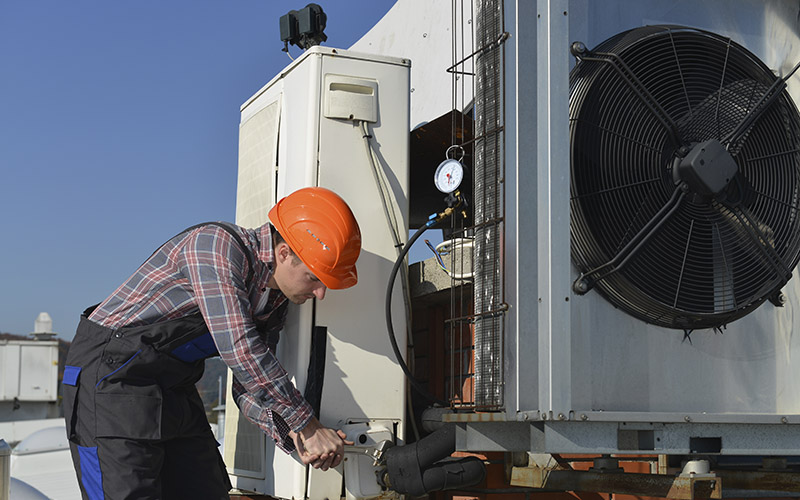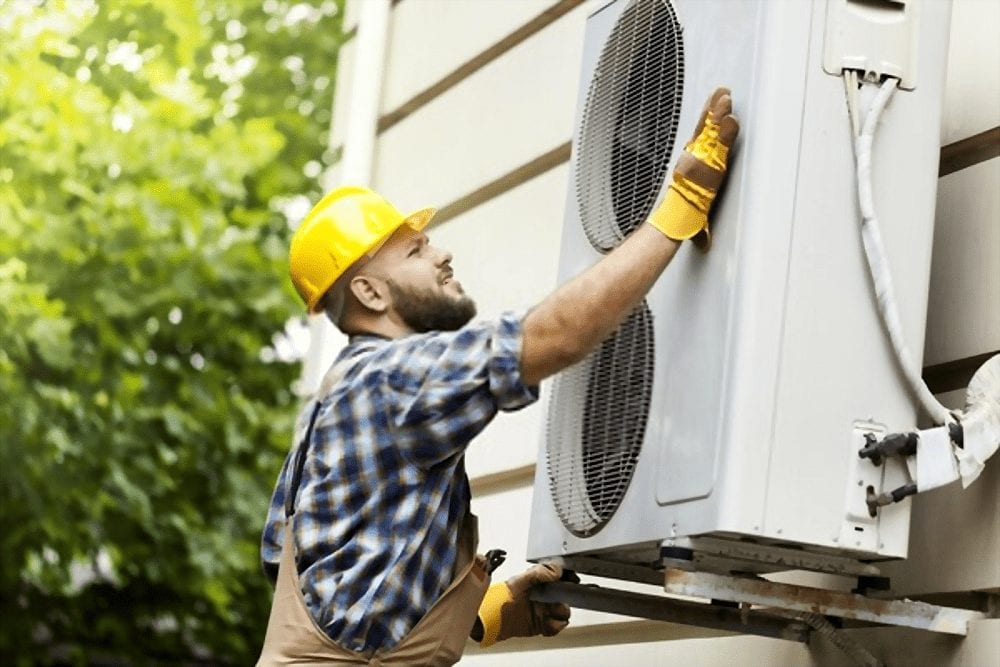The Best Ways to Improve Indoor Air Quality with ductless mini splits
The Best Ways to Improve Indoor Air Quality with ductless mini splits
Blog Article
Picking Between a Warmth Pump and Heating System: Trick Factors To Consider for Your Heating And Cooling Demands
When assessing home heating choices for cooling and heating needs, the choice between a warm pump and a furnace can be intricate. Each system uses unique advantages customized to particular climates and power effectiveness objectives. Recognizing these differences is vital for making an informed selection. Secret factors such as installment costs and ecological impact further make complex the selection procedure. Which option absolutely lines up with one's convenience and sustainability preferences? The complying with sections will discover these considerations in information.
Understanding Warm Pumps: Just How They Function and Their Benefits
While several property owners consider various heating choices, understanding exactly how warmth pumps feature and their benefits can substantially affect their choice. Heatpump operate by transferring warmth as opposed to producing it. In the winter, they extract warm from the outdoors air or ground and move it inside your home, while in the summer, they reverse this process, cooling down the home by eliminating heat outside. This twin capability makes them flexible for year-round environment control.One of the key advantages of heatpump is their power efficiency. They make use of significantly less electrical power contrasted to conventional furnace, possibly leading to lower energy expenses (heat pump replacement ooltewah tn). In addition, heatpump have a smaller sized carbon footprint, making them an eco-friendly choice. They likewise require much less upkeep than traditional systems, adding to long-lasting cost financial savings. Generally, recognizing the technicians and benefits of heat pumps can help homeowners make informed decisions regarding their heating and cooling down requirements
Checking Out Heating Systems: Kinds, Procedure, and Benefits
Heating systems come in various types, including gas, electric, and oil designs, each with unique operational mechanisms. Understanding these distinctions is important, as they impact performance and heating efficiency. Furthermore, heating systems provide numerous benefits, such as constant heat outcome and reliability in cooler climates.
Kinds of Heating systems
Furnace can differ substantially in style and operation, with furnaces being a prominent selection amongst house owners. There are a number of types of furnaces, each using different gas sources and modern technologies. Gas furnaces are usual, leveraging all-natural gas to create heat successfully. Electric furnaces, on the other hand, make use of electrical resistance to produce heat, commonly favored for their uncomplicated setup. Oil heaters, while much less usual, are efficient in areas with minimal gas gain access to (furnace replacement). Additionally, condensing heating systems take full advantage of power efficiency by catching and reusing exhaust gases. Each kind operates with a system of warmth exchangers and ductwork to disperse warm air throughout a home. Comprehending the differences in between these heating system kinds is important for notified HVAC decisions
Advantages of Heaters
For property owners looking for reliable heat during chilly months, the benefits of heating systems are significant. Heating systems give constant home heating, making sure even temperature levels throughout the home. They are especially reliable in severe cool, frequently outperforming heatpump in cold problems. Various types, including gas, electrical, and oil heating systems, provide versatility to fulfill varied requirements and preferences.Furnaces also have a tendency to have reduced initial installation costs compared to heatpump, making them a much more easily accessible choice for many. Their durable layout adds to a much longer life expectancy, with lots of units lasting over 15 years with appropriate maintenance. Additionally, modern-day heaters are usually equipped with sophisticated modern technology for improved efficiency, which can result in minimized energy bills. Overall, furnaces continue to be a reputable selection for efficient home heating.

Power Performance: Contrasting Warmth Pumps and Furnaces
When contrasting energy effectiveness in between heatpump and heaters, the Seasonal Power Effectiveness Proportion (SEER) plays a crucial function in establishing efficiency. Furthermore, a functional price evaluation reveals the long-lasting economic effects of each system. Understanding these elements can assist homeowners in making informed decisions regarding their home heating remedies.
Seasonal Power Performance Ratio
Energy efficiency plays a necessary duty in the decision-making procedure in between heatpump and furnaces, particularly when considering the Seasonal Energy Effectiveness Ratio (SEER) This metric steps the cooling effectiveness of heatpump over a whole cooling season, giving a standardized way to examine performance. Greater SEER ratings show better power effectiveness, equating to lower energy consumption and reduced utility costs. On the other hand, heaters are commonly analyzed making use of the Yearly Fuel Usage Efficiency (AFUE) rating, which mirrors heating effectiveness. When comparing these 2 systems, house owners must prioritize SEER ratings for warmth pumps, as they straight effect overall power financial savings and environmental sustainability. An extensive understanding of SEER can significantly influence the lasting fulfillment and cost-effectiveness of the selected HVAC remedy.
Operational Cost Evaluation
Comprehending the operational expenses connected with warmth pumps and heating systems is important for homeowners reviewing their choices. Warm pumps commonly offer higher energy efficiency, converting electric energy into warmth with very little waste. This results in lower monthly utility costs, specifically in modest climates. Alternatively, conventional heaters, particularly gas versions, may have lower ahead of time costs but can sustain greater functional expenses in time due to fuel rates and efficiency ratings.Moreover, heatpump can operate as both heating and cooling systems, possibly reducing the requirement for different HVAC systems. While first financial investments for heatpump may be greater, their lasting financial savings in energy effectiveness can make them an extra cost-effective option for lots of households. Cautious evaluation of regional energy prices is important to determine the very best option.
Installment Expenses: What to Anticipate for Each Heating Unit
Installation costs for heating unit can vary significantly in between heat pumps and heating systems, influencing house owners' choices. Heatpump usually have higher upfront installation costs, internet normally ranging from $3,500 to $8,000, depending on the system dimension and intricacy of installment. This includes the outdoor device, interior handling system, and essential ductwork alterations. Conversely, furnaces often tend to have reduced preliminary expenses, balancing in between $2,500 and $6,000, which can be appealing for budget-conscious homeowners. Installation expenses can boost if extensive ductwork is required.Moreover, the option of gas kind for heating systems-- natural gas, gas, or electrical-- can also influence installment prices. While heatpump provide energy performance, their preliminary investment may prevent some customers. Inevitably, assessing installment prices along with long-term savings and efficiency will certainly assist home owners in making notified decisions regarding their heater.
Environment Considerations: Which System Does Better in Your Location
How do environment conditions affect the effectiveness of heater? The performance of heat pumps and heaters can differ considerably relying on the regional environment. In moderate environments, heatpump excel by efficiently moving warmth from the outside air, making them an energy-saving option. Their effectiveness decreases in incredibly chilly temperatures, where they may have a hard address time to remove adequate warm. Conversely, furnaces, particularly gas models, supply regular and dependable heat no matter of outdoor conditions, making them better in chillier regions.In locations that experience milder wintertimes, heatpump can run properly year-round, giving both home heating and cooling. In comparison, regions with harsh winters months often take advantage of the toughness of furnaces. Eventually, recognizing the local climate is essential when choosing in between a heatpump and a heating system, as it directly influences their functional performance and overall efficiency.
Upkeep Needs: Long-Term Treatment for Heat Pumps vs. Furnaces
While both warm pumps and furnaces require normal upkeep to assure peak performance, their details demands and treatment routines vary considerably. Heating systems typically need much less regular attention, with yearly inspections sufficing to check for gas leakages, clean filters, and analyze general capability. Their easier design commonly enables for uncomplicated repairs.In contrast, heatpump necessitate biannual upkeep due to their double role in heating and air conditioning. This includes cleaning coils, examining refrigerant degrees, and making certain that both the indoor and exterior systems operate at their best. In addition, heat pump maintenance usually involves even more detailed components, making expert maintenance essential.Neglecting maintenance can result in lessened efficiency and raised power costs for both systems. Eventually, house owners should consider these long-lasting treatment needs when choosing between a heatpump and a heater, as proactive upkeep can expand the lifespan and performance of either system significantly.
Environmental Effect: Selecting a Lasting Home Heating Alternative
The ecological influence of home heating systems is an essential assessment for home owners seeking sustainable options. Heat pumps are typically much more energy-efficient than conventional heating systems, as they transfer heat as opposed to generate it, significantly decreasing carbon discharges. By using renewable resource sources, such as geothermal or air-source heatpump, home owners can better decrease their eco-friendly footprint.On the various other hand, natural gas heating systems send out greenhouse gases and add to air contamination, though they typically supply higher heat result. Nevertheless, innovations in technology have led to the advancement of high-efficiency heaters that minimize emissions.Ultimately, choosing a heating unit includes evaluating efficiency versus environmental influence. Home owners are motivated to review regional power sources and motivations for sustainable systems, ensuring an option that investigate this site straightens with both personal convenience and environmental obligation. The choice affects not just immediate convenience yet likewise lasting sustainability and environmental health and wellness.
Frequently Asked Concerns
How Long Do Warmth Pumps and Furnaces Usually Last?
The life expectancy of warmth pumps generally varies from 15 to two decades, while furnaces can last between 15 to three decades. Regular maintenance substantially affects their durability and performance in offering heating remedies.
Can I Use a Warm Pump in Very Cold Climates?
Warmth pumps can operate in exceptionally chilly environments, but their efficiency reduces as temperature levels drop. In such conditions, additional home heating resources might be necessary to maintain comfortable indoor temperatures and ensure peak efficiency.

What Is the Noise Degree of Warm Pumps Versus Furnaces?
The noise degrees of warm pumps and furnaces differ significantly. Generally, heatpump operate even more quietly than traditional heating systems, making them more suitable for those delicate to sound, while heaters may generate louder operational sounds during home heating cycles.
Are Heat Pumps Suitable for Both Heating & Cooling?
Warm pumps are indeed ideal for both heating and cooling (heat pump service). They operate by transferring warmth, offering reliable temperature control year-round, making them a flexible choice for house owners looking for an all-in-one heating and cooling option
What Size Heater Do I Required for My Home?
Identifying the proper size furnace for a home needs reviewing elements such as square video footage, insulation top quality, local climate, and the home's design. Consulting a specialist can guarantee an accurate evaluation and excellent comfort. Heat pumps usually supply higher energy efficiency, converting electric energy right into warm with marginal waste. In modest environments, heat pumps stand out by effectively moving warm from the outdoors air, making them an energy-saving alternative. Alternatively, furnaces, particularly gas models, offer trustworthy and regular heat no matter of outdoor conditions, making them preferable in colder regions.In locations that experience milder winters, heat pumps can operate effectively year-round, providing both heating and cooling. Warmth pumps are generally a lot more energy-efficient than conventional heating systems, as they transfer warm rather than produce it, considerably minimizing carbon exhausts. By using eco-friendly energy sources, such as air-source or geothermal warm pumps, home owners can additionally decrease their eco-friendly footprint.On the various other hand, natural gas furnaces emit greenhouse gases and add to air contamination, though they typically offer higher warmth outcome.
Report this page